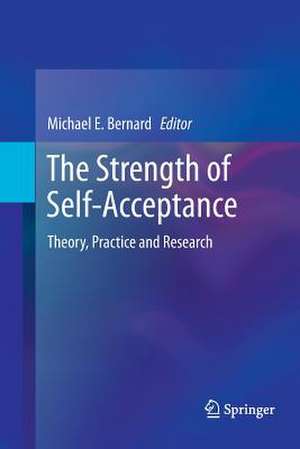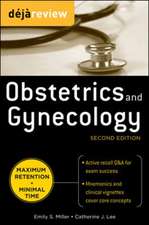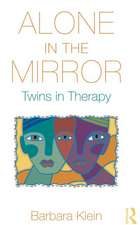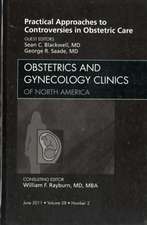The Strength of Self-Acceptance: Theory, Practice and Research
Editat de Michael E. Bernarden Limba Engleză Paperback – 12 iun 2015
Self-acceptance is recognized in diverse schools of Christian and Eastern theology as well as in various schools of counseling and psychotherapy (e.g., Humanistic, Rational-Emotive Behavior Therapy, Cognitive Behavior Therapy, Acceptance Commitment Therapy) as a major contributor to mental health, life satisfaction and wellness. A review of the professional literature reveals there is no text that spells out how different theologies, theories of personality and approaches to counseling and therapy conceptualize self-acceptance and how this concept is interrelated toother aspects and constructs of spirituality and psychological functioning(e.g., flexibility, mindfulness). Additionally, the field of positivepsychology, which studies the character strengths and virtues that helpindividuals to experience well-being and to flourish, has largely ignored theconcept of self-acceptance.
| Toate formatele și edițiile | Preț | Express |
|---|---|---|
| Paperback (1) | 430.93 lei 38-44 zile | |
| Springer – 12 iun 2015 | 430.93 lei 38-44 zile | |
| Hardback (1) | 725.24 lei 6-8 săpt. | |
| Springer – 29 apr 2013 | 725.24 lei 6-8 săpt. |
Preț: 430.93 lei
Preț vechi: 453.61 lei
-5% Nou
82.46€ • 86.27$ • 68.50£
Carte tipărită la comandă
Livrare economică 29 martie-04 aprilie
Specificații
ISBN-10: 1493901435
Pagini: 308
Ilustrații: XIX, 288 p.
Dimensiuni: 155 x 235 x 16 mm
Greutate: 0.44 kg
Ediția:2013
Editura: Springer
Colecția Springer
Locul publicării:New York, NY, United States
Public țintă
Professional/practitionerCuprins
Introduction to Self-Acceptance: Theory, Theology and Therapy.- Humanistic Psychology and Self-Acceptance.- Self-Acceptance in Buddhism.- Self-Acceptance and Christian Theology.- The Value of a Human Being.- Psychologically Flexible Self-Acceptance.- Unconditional Positive Self-Regard.- Unconditional Self-Acceptance and Self-Compassion.- Self-Acceptance and Happiness.- Measuring and Characterizing Unconditional Self-Acceptance.- Self-Acceptance in the Education and Counseling of Young People.- Self-Acceptance and the Parenting of Children.- Self-Acceptance and Successful Relationships.- Self-Acceptance in Women.- Self-Acceptance and Chronic Illness.- Compassionate Self-Acceptance and Aging.
Notă biografică
Michael E. Bernard, Ph.D. is an international consultant to universities, educational authorities, organisations, and government as well as a Professor at the University of Melbourne, Faculty of Education. He is the Founder of You Can Do It! Education, a program for promoting student social-emotional well-being and achievement that is being used in over 6,000 schools in Australia, New Zealand, England, and North America. After receiving his doctorate in educational psychology from the University of Wisconsin, Madison, he worked for 18 years in the College of Education, University of Melbourne, Australia. In 1983, he was appointed as Reader and Coordinator of the Master of Educational Psychology Program. From 1995-2005, he was a tenured professor in the Department of Educational Psychology, Administration and Counseling, College of Education, at California State University, Long Beach. Professor Bernard has worked as a consultant school psychologist helping families and schools address the educational and mental health needs of school-age children. He has spent extensive time counselling children with emotional, behavioural, or academic difficulties. Professor Bernard is a co-founder of the Australian Institute for Rational Emotive Behaviour Therapy and is the author of many books on REBT. For eight years, he was the editor-in-chief of the Journal of Rational-Emotive and Cognitive-Behaviour Therapy. He is the author of over 50 books, 15 book chapters, and 30 journal articles in the area of children’s early childhood development, learning and social-emotional well-being, as well as parent education, teacher professional development, and school improvement.
Textul de pe ultima copertă
The rationale for this book is the exploration of how different theories (e.g., humanistic, cognitive-behavioral), theologies (e.g., Christianity, Buddhism) and therapies (e.g., REBT, CBT, ACT) view self-acceptance as a catalyst for the alleviation of emotional misery as well as an energizer supporting growth towards happiness and fulfillment.
An additional rationale for this book is the desire to see self-acceptance recognized in the field of positive psychology as a fundamental character strength contributing to flourishing.
Divided between theory and practice, The Strength of Self-Acceptance assembles current research and seminal theory on self-acceptance both as scientific construct and as character strength in one lucid, well-documented reference.
An expert panel of international scholars and practitioners examines links between self-acceptance and related concepts such as self-esteem, self-awareness, acceptance of others, and happiness.
Specific areas for practice include parenting, education, relationships, women's and older people's issues, and chronic illness, as well as guidelines for developing self-acceptance in therapy with all clients, and for measuring client progress. Throughout, self-acceptance is revealed not merely as a desirable state, but one essential to positive development and fulfillment. Included in the coverage:
- What Maslow, Rogers and May have to say about self-acceptance
- Albert Ellis and Steven Hayes present their views
- Buddhist radical acceptance and the willingness to experience and accept whatever is taking place in the moment
- How Christian scripture through the lessons of Jesus Christ teaches that sin does not reduce human worth
- The human biological propensity for self-depreciation and the importance of teaching unconditional self-acceptance
- Ways to measure self-acceptance.
- Classroom and counselling strategies for teaching self-acceptance to young people.
- Self-acceptance as an integral component of comprehensive mental health programsThe importance of social interest and responsibility in the encouragement of self-acceptance
- Compassionate self-acceptance and the aging process
The Strength of Self-Acceptance offers a profound understanding of the nuances of self-acceptance to scholars in theology, psychology, counseling, and psychotherapy. In addition, the book should have an immediate impact on the work of counselors, clinicians and therapists.
Caracteristici
Includes a chapter by Steven Hayes
Includes a broad range of international scholars and multi-disciplinary contributions from theology, psychology, and counseling
Includes supplementary material: sn.pub/extras











